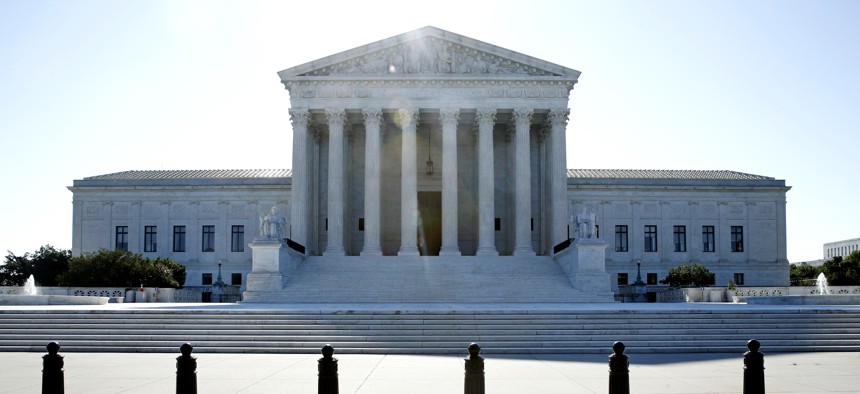Supreme Court Rules Montana Scholarship Program Can’t Exclude Religious Schools

The sun rises behind the Supreme Court on Capitol Hill in Washington, Monday, June 29, 2020. AP Photo/Patrick Semansky
The decision opens the door for similar bans in other states to be struck down.
The U.S. Supreme Court on Tuesday sided with parents seeking to use state scholarship funds to help pay for their children’s education at religious schools.
In a 5-4 decision, the court ruled that Montana’s exclusion of religious schools from a state scholarship program, which was funded through tax credits, violated the Constitution.
The court ruling does not require states to fund religious education, but instead finds that such programs cannot differentiate between religious and secular private schools.
"A state need not subsidize private education. But once a state decides to do so, it cannot disqualify some private schools solely because they are religious," wrote Chief Justice John Roberts in the opinion for the court.
The Montana State Legislature started the scholarship program in 2015, creating a pot of money for private scholarship organizations by granting tax credits worth up to $150 to individuals and businesses who donated to the organizations. The money could then be used to provide scholarships to children to attend private schools.
The Montana Department of Revenue then barred families from using the scholarships at religious schools. Three low-income mothers who said they were counting on the scholarship money to keep their children enrolled in a Christian school then filed a lawsuit. They argued the state’s restrictions on public funds did not apply to private donations incentivized by tax credits and that singling out religious schools was a violation of the Equal Protection Clause of the Constitution.
In 2018, the Montana Supreme Court struck down the whole program, citing a state constitutional ban on state aid to religious schools.
School voucher advocates said the Espinoza v. Montana Department of Revenue ruling will have widespread implications for parents who seek to send their children to private religious institutions.
“This is a landmark case in education that will allow states across the country to enact educational choice programs that give parents maximum educational options,” said Erica Smith, a senior attorney with the Institute for Justice, which argued the case at the Supreme Court.
But the American Federation of Teachers said the decision amounts to an attack on public education by draining off needed resources.
“It will hurt both the 90% of students who attend neighborhood public schools, by siphoning off needed funds, and, in the long term, those who attend religious schools by curtailing their freedom with the accountability that comes with tax dollars,” said AFT President Randi Weingarten.
Montana's Democratic governor also expressed concern about the ruling.
“Montanans have a constitutional right to a quality public education. I’m disappointed in today’s decision, and will continue the fight for public education in Montana," Gov. Steve Bullock said.
In a dissent, Justice Sonia Sotomayor called the court’s ruling “perverse.”
“Without any need or power to do so, the court appears to require a state to reinstate a tax-credit program that the Constitution did not demand in the first place,” she wrote.
Thirty-seven states bar the use of public funds to “aid” sectarian institutions, and both Vermont and Maine outright exclude religious schools from state programs that will pay for students to attend either public or private schools. The ruling means that state policymakers will be able to create scholarship programs with public funds that allow parents to select religious schools and Vermont and Maine will have to stop excluding religious schools from their programs, said Institute for Justice attorney Tim Keller.
In the decision, Roberts noted that the court has upheld government programs in the past that spend taxpayer money on equal aid to religious and secular organizations, “particularly when the link between government and religion is attenuated by private choices.”
“A school, concerned about government involvement with its religious activities, might reasonably decide for itself not to participate in a government program,” Roberts wrote. “But we doubt that the school’s liberty is enhanced by eliminating any option to participate in the first place.”
Jeanne Allen, the founder and chief executive of the Center for Education Reform, called the ruling an “extraordinary victory for student achievement, parental control, equality in educational opportunities, and First Amendment rights.”
Andrea Noble is a staff correspondent with Route Fifty.
NEXT STORY: The US Isn’t in a Second Wave of Coronavirus – The First Wave Never Ended





